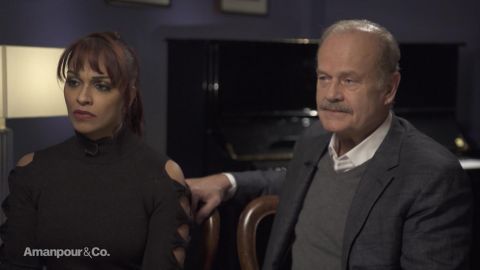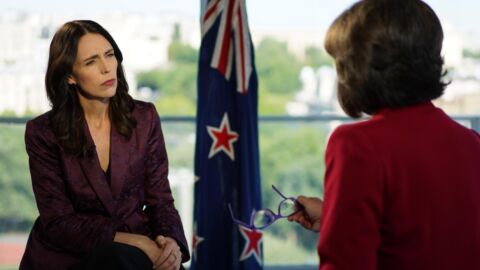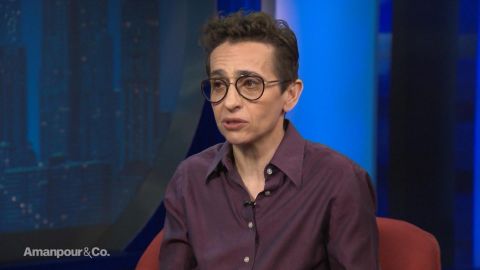Read Transcript EXPAND
CHRISTIANE AMANPOUR: Masha Gessen is a Russian-American journalist with intimate knowledge of both countries. And her latest book, “The Future is History,” is a gripping look at the toxic legacy of the Soviet era. She sat down with Michel Martin to discuss the release of the Mueller report and Putin’s end game.
MICHEL MARTIN: Masha Gessen, thanks for talking with us.
MASHA GESSEN, STAFF WRITER, THE NEW YORKER: Thank you for having me.
MARTIN: Now, you occupy this very unique position in journalism, both having a deep background in Russian journalism and then a deep background in American media, but you were skeptical of the Mueller report, at least you were skeptical that it would demonstrate some, I don’t know what word would you want to use, some sort of smoking gun? So, the first question I wanted to ask you is why were you skeptical?
GESSEN: I was skeptical for a couple of reasons. One is that, and I think we know this now, right, it’s very difficult to demonstrate any kind of impact on the outcome of the election, it’s probably impossible, and I think we knew that going in, but there is a little bit of magical thinking that somehow it was the whole election was going to be exposed as a fraud because of Russian interference. But the other — the bigger reason I was skeptical and I think it has been borne out, is that I just know how haphazard and incompetent and decentralized and how much of a hustle the Russian government is. And I read the volume one of the Mueller report as a story of swindlers and hustlers and con men who don’t have a conspiracy because they don’t actually have a common goal. Each one of them is out for himself, mostly it’s men, with one exception, I think. Each one has his own con, each one has his own agenda, and each one is trying to con everybody else.
So, in a sense, it’s the opposite of a conspiracy. It is not what we want in government and I think, you know, it certainly does not make Trump look good, and I wouldn’t call it an exoneration. I think people who find Trump not only unfit but unimaginable, right. We’re hoping that the report would say, “OK, he came from outer space or at least from Russia,” right. He is not a president elected by Americans, in some definitive way. That didn’t happen. There isn’t a story that can be neatly tied up like that.
MARTIN: So, what did you find in the Mueller report? What do you think the Mueller report shows?
GESSEN: Well, I spent most of my time reading volume one, which is the Russia part of the story, right. So, it’s not the obstruction of justice part, which is much more straightforward and I think definitive, right. The Russia part is fascinating to me, because it is a story of cons. And I think that — and this actually — you know, this is why I think that the story of the Mueller report is actually part and parcel of “The New York Times” report that came out on Trump’s taxes, right. There’s a swindler, a con man, who has conned the country into making him president, and that’s how I read the Mueller report.
MARTIN: So, the other thing that has fascinated me about your reporting is that you have suggested that the American media have maybe — is it the media or is it the American public or some segments of the American public are completely overreacting to Putin or to Russia — that Russia just looms too large in the American consciousness right now. Could you talk more about why you’ve been saying that as well?
GESSEN: It’s a tricky position for me to find myself in, because not that many years ago, I wrote a biography of Putin in which I portray him as a very dangerous, very scary man, and he is. He absolutely is. He is a tyrant. He’s a dictator. He murders and jails his opponents. He is as dangerous as those kinds of men are. He’s also a small-time dictator and not a very intelligent man, one who doesn’t have a master plan, one who is a different kind of con man, but he has somehow now managed to con his way into the American imagination as the master mastermind behind everything. And there is no master or anything there, right.
There is a lot of meaningless, there is a lot of scrappiness, there are some good instincts, good power instincts, but there isn’t what Americans imagine. You know, the master plan, the concerted attack on American democracy.
MARTIN: You remind me of something that former President Obama said. He said this is a small regional power with nuclear weapons and a dwindling supply of oil.
GESSEN: Right.
MARTIN: That’s what he said.
GESSEN: I think that is an accurate assessment. It has a bigger ambition than that, but that’s an accurate assessment of Russian status.
MARTIN: So what is Putin’s goal?
GESSEN: Putin’s goal is to reestablish Russia as a superpower. He will use anything that he can get his hands on to do that. He has very successfully, for example, used Syria to reestablish Russia as a superpower. Syria, in some ways, was Putin’s — at a certain moment it looked like Putin’s downfall and a certain moment the was his — the height of his strength. Putin swooped in and basically hijacked Syria. This is Summer/September of 2013, which culminates with the Putin op-ed in “The New York Times” which he uses American language to call out American exceptionalism. He promised that he would disarm Bashar al-Assad, and get rid of the chemical weapons.
Well, six years later, we know that that didn’t happen. We know that, in fact, Putin helped al-Assad win the war, and chemical weapons have been used.
MARTIN: So his goal is to make Russia a superpower to what end? Because I think Americans have a really hard time visualizing like what is the goal of this power? Because in the American imagination, yes, it’s true that America has an expansionist past. But I think if we were to stop most Americans on the street right now, they don’t see themselves as wanting to conquer the world just to do it.
GESSEN: Russia is an empire. Never stopped being an empire. It briefly considered not being an empire and decided that that wasn’t such a great idea. So Russia wants to reclaim its greatness. There’s a great sense of nostalgic bitterness in Russia after ’91 that Putin has weaponized. So that’s part of it. Another part is — and it’s related, right. There’s a sense of humiliation, a sense of resentment that Putin has also weaponized very well. So, being a superpower is an end in itself.
Being a superpower doesn’t necessarily mean annexing other countries that serve the imperial impulse. Being a superpower just means having other countries scared of you and having the United States know that it can’t take a step without consulting Russia.
MARTIN: How do you understand Putin’s recent moves, and say North Korea, and Venezuela? Well, of course, we talked about Syria but how do you understand those recent moves?
GESSEN: Well, Putin doesn’t have long-term plans. He is a quintessential opportunist. So when he sees an opportunity open up, he always uses it. The opportunity with North Korea is quite obvious, talks with the United States broke down, so there’s a space there that he could step into, which he needed. Venezuela is a little bit more interesting in a sense because I think that he has a way of identifying with dictators who are facing mass protest and foreign intervention. So I think that he identifies with the leader of Venezuela, and fears that if he is removed, then that means that something like that could happen to Putin as well.
MARTIN: Tell me about the Trump-Putin relationship. How do you read it?
GESSEN: Well, yes. I mean one of the things that gets lost in talking about Russia, and how cozy some Americans imagine Trump to be with Russia, is just how terrible the Russian-American relationship is at the moment. It’s at its lowest point since the end of the Cold War. We are this close to having no diplomatic relations at all. There are consulates in St. Petersburg and there is a Russian Consulate in San Francisco, in a tit-for-tat attack, these were shut down, but also the embassy in Moscow has been designated. So many diplomats were expelled that cultural programs and educational programs have been kicked out.
What that means is that there’s such a thin diplomatic relationship right now between the United States and Russia. That’s a very dangerous situation, right. When we read histories of the Cold War, at least I’m always struck by moments of crisis when relationships between diplomats on the ground made the difference between total annihilation of the world, as we know it, and some kind of bad peaks. We don’t have that anymore. And that’s a deterioration that has happened particularly in the last couple of years.
MARTIN: But could this — given that scenario, could then the perceived closeness between President Trump and President Putin be to the benefit of the world? I mean I’m noting as you and I are speaking now that the two presidents had an hour-long conversation which was outrageous to many American political leaders for the opposition, from the Democratic side. They thought this is outrageous that you’re having this hour-long conversation with him, when you never mentioned Russian meddling, at least according to the accounting of both sides. But is there a way their personal relationship, for whatever motivates it, could be to the benefit of the world?
GESSEN: Well, I do find that cold comfort to think that the fate of the world depends on Putin and Trump being able to get on the phone. I would really much rather imagine that it is in the hands of more intelligent, less temperamental diplomats, but also because — and this I think is very important, right.
When we talk about diplomatic relations, we talk about national interests. We talk about normal countries where institutions exist to promote national interests as it is generally understood. Putin runs a mafia state. There’s no such thing in Russia as a national interest that is distinct from Putin’s personal accrual of power and money. It’s different from any kind of dictatorship or tyranny. A mafia state is a distinct phenomenon. And we have Trump, who I think would have a mafia state if he could get away with it, and that’s certainly what he has been trying to build.
MARTIN: So what is your worst case scenario given all that? I think the operating theory of I’ll just articulate it, I’m not endorsing it, I’m just articulating it that I think the operating theory on behalf of the people who are opposed to Trump is that he has some sort of financial relationship with the Russians, that he is beholden to them in some way. That is one reason why there is such a deep interest in his personal finance, and however disturbing and corrupt that may be, the argument I think then becomes that there is — that both parties have an investment in maintaining cordial relations because both — their financial interests would be jeopardized.
GESSEN: I think that misunderstands the nature of the beast, right. It misunderstands the mafia state because there’s an assumption I think inherent to what you said that Putin is — represents Russia in some sort of national way, right, and not just himself, that Trump would represent the United States in some sort of national way and not just his own financial interest. I also don’t subscribe to that theory that Trump is financially beholden to Putin for a couple of reasons. One, which is that we just don’t have enough evidence to support it and I don’t like theories. They’re entirely connecting the dots. But also because it’s an unnecessary explanation for his admiration for Putin. He admires all dictators. He admires people who perform and exercise raw power. That’s what he wants to be. He doesn’t need to be financially beholden to any of them in order to admire them.
MARTIN: You said, look, I don’t like theories that are based on speculation and not about facts. More broadly, does that concern you? I mean, do you think that the American media have veered too far in the direction of speculating about this president and his behavior?
GESSEN: There is a kind of mentality that I think suggests that a journalist’s job is to expose secrets. And I think that exposing secrets is great, but focusing on truth is actually much more important. And the distinction between truth and secrets is that truth can be observed.
We can observe reality together. And that’s another way of building connections, political connections between journalists and other members of the public, whereas secrets have to be revealed. And I think that we would all be much better off analyzing together what we can observe together. There’s enough that Trump is giving us about the way he talks, the things that he says are important, the way he talks about Russia, but also the way he talks about the media, the way he talks about politics, the way he talks about protests, the way he talks about his opponents. There’s enough there to not have to hypothesize that he’s beholden to Putin and still be disturbing and actually still have valuable observations about his relationship to Russia and to other dictators.
MARTIN: Looking back to what we talked about at the beginning, I mean you have a deep record both working in Russia as a journalist and then many, many years working here in the United States. And I’m wondering how you think that experience may inform how you look at this?
GESSEN: You know, what I actually think informs me more is that I got my start in community publishing. I started out in the Gay Press in the ’80s. I worked in the Gay Press also during the aids crisis, right. So I really knew from the time I was a teenager, which is when I started working there, that getting information to people was a political act, that it made the difference between life and death for some people. You could go and write about drug trials, and you could go and write about acts up that came on the scene, and that just writing was political, and just writing was activism.
MARTIN: How does this address the current problem where the president has explicitly identified the mainstream media, except for his preferred conservative outlet, as the enemy of the people? And we — there’s certainly nothing to take comfort from in the Russian example.
GESSEN: Well, I mean the reason the president identifies the media as the enemy of the people, and not only gets away with it but gets points for it, is that there’s a crisis of trust in the media, is that there’s a huge constituency in this country that feels justly not represented by the media. And I think that the way that we address that crisis, right, not the crisis that is presented by the president, but the crisis of trust is by representing better, by situating ourselves in communities, and by being more transparent, which is something that inherently leads to more trust.
MARTIN: Masha Gessen, thank you so much for talking to us.
GESSEN: Thank you for having me.
About This Episode EXPAND
Christiane Amanpour speaks with New Zealand Prime Minister Jacinda Ardern about her call to action on internet extremism, gun control and climate change. She also speaks with Kelsey Grammer and Danielle de Niese, who are both starring in “Man of La Mancha” on the London stage. Michel Martin speaks with Russian-American journalist Masha Gessen about Mueller, Trump and Putin.
LEARN MORE


